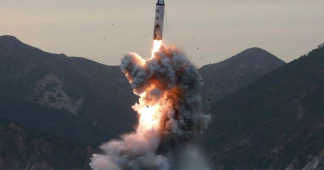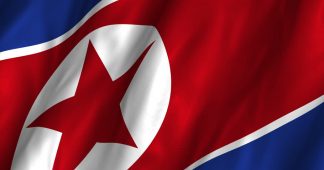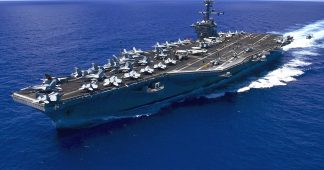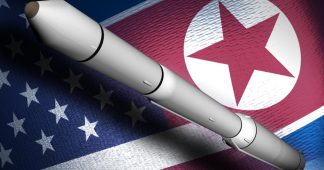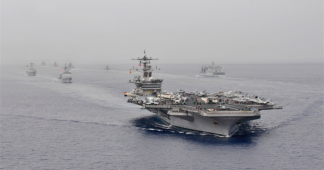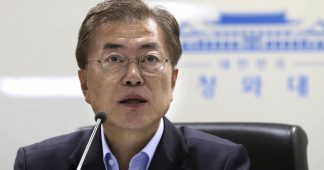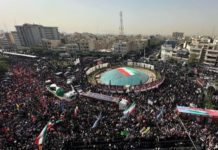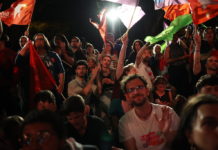Published in www.rt.com
In response to what North Korea called another successful test of an ICBM on Friday, a pair of supersonic B-1B Lancer bombers joined by Japanese and South Korean fighter jets flew over the Korean Peninsula Sunday in a show of force.
The US Pacific Air Forces said that the 10-hour sequenced bilateral missions were a “direct response” to Pyongyang’s missile test on Friday, and the earlier July 4 launch of what was claimed to be a Hwasong-14 rocket.
The American bombers took off from a US air base in Guam, and were joined by Japanese and South Korean fighter jets, the US Pacific Air Forces said in a statement.
“North Korea remains the most urgent threat to regional stability,” Pacific Air Forces Commander General Terrence J. O’Shaughnessy said, as cited by AP.
“If called upon, we are ready to respond with rapid, lethal, and overwhelming force at a time and place of our choosing,” he warned.
“The successful ICBM test-fire is another great victory which dealt a heavy blow to the U.S. imperialists and its vassal forces keen on obliterating the DPRK’s [the Democratic People’s Republic of Korea] dignity and its right to existence,” Kim Yu Chol, a researcher of the State Academy of Sciences, told KCNA.
KCNA reported that the Hwasong-14 (the Korean word for ‘Mars’) reached an altitude of 3,725km (2,314.6 miles) and flew 998km (620 miles) for 47 minutes and 12 seconds before landing in waters off the Korean Peninsula’s east coast on Friday.
The Russian military said the weapon was an intermediate-range ballistic missile (IRBM), citing data from its missile warning system, adding that it flew 732 kilometers, while the US and South Korea said it was an intercontinental ballistic missile (ICBM). While IRBMs have ranges between 3,000 and 5,500 kilometers, known ICBMs can fly out 10,000km or more.
On Saturday, the US and South Korean militaries fired live surface-to-surface missiles from rocket launchers in response to Pyongyang’s missile test. Videos posted by the South Korean Ministry of Defense showed the US-made Tactical Missile System, known as ATACMS, as well as its own Hyunmoo Missile II. The missiles hit the East Sea on Saturday morning, where North Korea’s ballistic missile is believed to have landed, as part of a live-fire exercise to demonstrate its “precision firing ability,” the US 8th Army said.
North Korea has warned of “a stern action of justice” if Washington calls for new sanctions in response to Pyongyang’s latest test.
“If the United States sticks to its military adventurism against us and super-intensive sanctions schemes, we will respond with stern action of justice as we have already declared,” North Korea’s Foreign Ministry spokesman said in a statement on Sunday, KCNA reported.
Trump ‘very disappointed’ in China’s reaction
Pyongyang’s main ally, China, said it opposes North Korea’s missile launches, which it says violate UN Security Council resolutions targeting Pyongyang’s banned nuclear and missile programs.
“At the same time, China hopes all parties act with caution, to prevent tensions from continuing to escalate,” China’s Foreign Ministry said in a statement on Saturday.
Beijing’s appeal for “all parties” to act with caution was apparently not received well by US President Donald Trump, who said he was “very disappointed in China.”
“Our foolish past leaders have allowed them to make hundreds of billions of dollars a year in trade, yet..,” the US leader tweeted.
“…they do NOTHING for us with North Korea, just talk. We will no longer allow this to continue. China could easily solve this problem!” Trump said in a subsequent tweet.
Japanese Foreign Minister Fumio Kishida, meanwhile, held telephone talks with US Secretary of State Rex Tillerson. Both reportedly agreed on the need to put “the heaviest possible pressure” on North Korea, AFP reported.
“We confirmed that we will closely cooperate in adopting a fresh UNSC (UN Security Council) resolution, including severe measures, and working on China and Russia,” Kishida told reporters.
